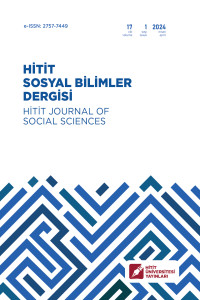Dâhilde ve Hariçte İşleme Rejimi İşlemlerinin Vergi Usul Kanunu ile Türkiye Muhasebe Standartlarına Göre Muhasebeleştirilmesi
Accounting of Inward and Outward Processing Regime Transactions According to the Tax Procedure Law and Turkish Accounting Standards
Author(s): Aykan COŞKUNSubject(s): National Economy, Law on Economics, Public Finances, Fiscal Politics / Budgeting, Socio-Economic Research
Published by: Hitit Üniversitesi
Keywords: Foreign Trade Accounting; Inward Processing Regime; Outward Processing Regime; Tax Procedure Law; Turkish Accounting Standards;
Summary/Abstract: An export-led growth policy was adopted in Turkey after 1980, and various incentives were introduced to increase exports as the foreign trade deficit continued. Inward and Outward Processing Regimes are two of the regulations made to promote exports. Inward Processing Regime is the regime in which the customs duties of imported goods that are not in free circulation are secured or the goods in free circulation are processed and exported in the Turkish Customs Territory. In the Inward Processing Regime, it is desired to procure raw materials and materials from abroad, to give competitiveness to the goods to be exported, to increase the market share of exported goods abroad and to diversify the exported goods. Outward Processing Regime is the regime in which the provisions regarding the temporary export of goods in free circulation from the Turkish Customs Territory to be subjected to outward processing activities and the re-entry into free circulation of the products obtained as a result of these activities with full or partial exemption from import taxes are applied. In the Outward Processing Regime, it is possible to benefit from technology and quality standards abroad and cheap labor costs. Since Turkey has made regulations for the harmonization process with the European Union and is a party to the agreements within the Customs Cooperation Council, it has updated the Inward and Outward Processing Regime procedures and the statuses of foreign trade companies. According to the Official Gazette dated 23/11/2016 and numbered 29897, the validity period of these documents of foreign trade companies holding Class A or Class B approved person status certificates was applied until 15/8/2017, and in the following period, these status certificates were abolished and replaced by the Inward Processing Regime Communiqué. (Export: 2006/12) "Authorized obliged party" and "approved person" certificates were introduced with Article 9 (Amended: OG2/5/2018-30409 bis). Examining the Inward and Outward Prcessing Regime transactions within the scope of new regulations and accounting for these transactions in accordance with the Tax Procedure Law and Turkish Accounting Standards can fill one of the gaps in the field. In the study, laws, directives and communiqués regarding Inward and Outward Processing Regime transactions were examined. The aim of the study is to account for possible Inward and Outward Processing Regime transactions of foreign trade companies within the scope of new regulations, in accordance with the Tax Procedure Law, Turkish Accounting Standards-2 Inventories Standard and Turkish Accounting Standards23 Borrowing Costs Standard. In the study, case studies were developed and accounting records were made. As a result of the study, it was determined that some transactions were accounted differently within the scope of the Inward Processing Regime according to the Tax Procedure Law and Turkish Accounting Standards, while there was no difference in the accounting of the transactions within the scope of the Outward Processing Regime. When accounting for import-related maturity differences, it is seen that the company's production costs are calculated higher according to the Tax Procedure Law regulations, and the financing expenses are calculated higher according to the Turkish Accounting Standards regulations. In order to eliminate these differences between accounting records and to reduce the costs arising from companies subject to independent audit recording in accordance with both the Tax Procedure Law and Turkish Accounting Standards / Turkish Financial Reporting Standards, the Accounting Plan in Compliance with Financial Reporting Standards should be implemented as soon as possible, instead of the Uniform Accounting Plan, which does not meet the needs. is required. In the study, it was found that when foreign trade companies benefit from the Inward Processing Regime in the form of a Conditional Exemption System, raw material and material costs can be reduced because discounted guarantees are applied, and the Inward Processing Regime can provide a financing advantage since the guarantees can be given by letters of guarantee other than cash. When the Inward Processing Regime is used as a Reimbursement System, it can be said that this method is more suitable for the public interest since "customs administrations collect import taxes in advance. Outward Processing Regime can be seen as an alternative to domestic technology, quality standards and labor costs. It is obvious that Turkey, which has a balance of payments deficit, needs to export products with high added value. For this reason, it is recommended that foreign trade companies produce in this context and increase their incentives.
Journal: Hitit Sosyal Bilimler Dergisi
- Issue Year: 17/2024
- Issue No: Sp. Issue
- Page Range: 128-143
- Page Count: 16
- Language: Turkish

